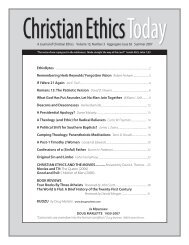Issue 032 PDF Version - Christian Ethics Today
Issue 032 PDF Version - Christian Ethics Today
Issue 032 PDF Version - Christian Ethics Today
Create successful ePaper yourself
Turn your PDF publications into a flip-book with our unique Google optimized e-Paper software.
The “pro-life” slogan and its political agenda set forth by<br />
the Vatican and adopted in the United States by some<br />
Protestant groups as well as the Catholic bishops, has seldom<br />
been examined as a whole. Abortion, for example, has taken<br />
center stage, and capital punishment has been largely neglected.<br />
My interest is to examine the death penalty in depth after<br />
contrasting it with other aspects of “protecting life” such as<br />
self-defense and war.<br />
The state permits certain forms of self-defense, but actually<br />
engages in the direct killing of convicted killers, apparently<br />
unaware that it is killing people to prove that killing people is<br />
wrong.<br />
The pro-life doctrine, by contrast, permits a person’s selfdefense<br />
and the defense of his family or friends, even if it<br />
results in killing one or more people. It is only women who<br />
have no right to self-defense in a conflict of nascent life with<br />
their existing lives. They are denied the right to use contraceptives<br />
to prevent a pregnancy that would endanger their lives or<br />
health. They may not have an abortion even to preserve their<br />
lives or health if damage to health would lead to an early<br />
death.<br />
Pro-life doctrine does not apply to killing in war, as evident<br />
in Vatican concordats with war-making states. Its agents in<br />
Argentina even gave consent to the killing of civilians suspected<br />
of being Communists or sympathetic to them. (Emilio<br />
Mignone, Witness to the Truth: The Complicity of Church and<br />
Dictatorship in Argentina 1976-1983, Orbis Books)<br />
Although pro-life doctrine is selective, its absolute opposition<br />
to the death penalty has a completely rational and ethical<br />
validity. There is no conflict of life with life in the sentencing<br />
of a person for murder, since the state has the power to isolate<br />
the convicted killer from society and even from other prisoners.<br />
There is no obvious discrimination such as occurs against<br />
women in a patriarchal religious or social system. Men and<br />
women can receive similar sentences and similar treatment in<br />
prison.<br />
An ethical examination of the death penalty should<br />
include a biblical analysis. The Bible provides no clear justification<br />
for capital punishment in spite of statements that an<br />
eye for an eye, tooth for tooth, and life for life are justified. In<br />
practice, society has rejected the first part; we would consider<br />
barbaric the taking of a person’s eye for causing the loss of an<br />
eye, or a tooth for the loss of a tooth.<br />
The Bible also is not consistent in providing a death penalty<br />
for those responsible for the death of others. The book of<br />
Hebrews, for example, praises murderers such as Gideon,<br />
8 • FEBRUARY 2001 • CHRISTIAN ETHICS TODAY<br />
An Eye for an Eye?<br />
By John M. Swomley, Professor Emeritus of Social <strong>Ethics</strong><br />
St. Paul School of Theology<br />
Samson, and David as “men of faith.” And in the book of Acts<br />
David is called the “servant of God.”<br />
The Bible, however, not only includes statements excusing<br />
killing, it also describes some important acts against the death<br />
penalty. The first murder in the Bible, of course, is that of<br />
Cain killing Abel. In this instance, God did not kill Cain. His<br />
punishment was to make him a wanderer with a mark on his<br />
forehead so that no one will kill him. To kill in revenge or to<br />
permit killing a murderer would have justified killing as such.<br />
Although David engaged in killing, his punishment from<br />
God was a refusal to let him build the Temple because his<br />
hands were stained with blood. In the scriptures the penalty<br />
for a woman caught in adultery was death, but Jesus rejected<br />
that penalty with the admonition, “Sin no more.”<br />
When Paul was in prison with a runaway slave who could<br />
be killed for such flight, Paul sent him back to his master with<br />
a strong plea to the master to accept him as a brother.<br />
In other words, the penalty of death is not a result of religious<br />
or moral values, but a simple act of vengeance exercised<br />
by government and supported vociferously by some of its citizens.<br />
The chief basis on which any severe punishment can be<br />
morally justified is the encouragement of expiation, or making<br />
amends for wrongdoing. Punishment that does not permit the<br />
possibility of expiation or a change in character or attitude is<br />
inherently wrong. Execution does not permit atonement or<br />
any future action to make amends for the crime committed.<br />
The death sentence automatically precludes earning respect or<br />
commutation of sentence either by working to finance or support<br />
victims of the crime or by performing an extended public<br />
service as a means of public acknowledgment of a changed life.<br />
From the standpoint of society, punishment without a<br />
social effort to reform or educate the prisoner is an acknowledgment<br />
that the general public is unconcerned about the<br />
value of life and the possibility of changed lives. The state, by<br />
taking life in revenge, sets no higher standard than the person<br />
who also kills in an act of anger, hate, or revenge. In effect it<br />
thereby says human life is not inherently valuable or worth<br />
saving, that life is judged by a crime or crimes, not by earlier<br />
good conduct or the possibility of repentance.<br />
Does the state have any responsibility for the social conditions<br />
of poverty, exaltation of power, or a culture that glorifies<br />
violence and makes weapons easily acceptable, a culture that<br />
permits corruption in high places or by wealthy corporations<br />
with little if any punishment?<br />
Emil Brunner, a German theologian, wrote: “In every












